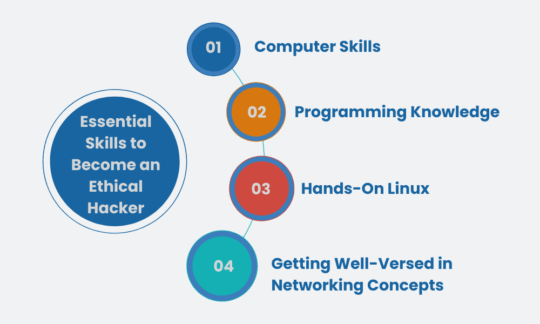Gone are the days of the guys who wore black hats and white hats in movies, signifying their role. In a deadly world where cyberattacks are happening every second, it is essential to stay abreast. Fortunately, the cybersecurity industry landscape is growing at a rapid pace. Moreover, organizations are searching for individuals who can closely monitor the bad actors and incorporate preventive measures to avoid unusual data or financial loss.
Here is where the role of ethical hackers comes into play! Ethical hackers are individuals who adopt hacking practices for the greater good. They aim to find and investigate the weak points in a computer system or network that hackers can exploit. The good news is that ethical hacking is now becoming a high-paying profession, considering the growing demand for ethical hacking opportunities.
Are you among the ones looking to kickstart your career in ethical hacking? Read on the blog and explore the known and unknown about building a successful career in ethical hacking.
What Role Do Ethical Hackers Play?
A white-hat hacker is an ethical hacker, while black-hat hackers intend to hack the system or network for malicious purposes. The white hat hackers keep a close watch on the black hat hackers and prevent the organization's security posture.
The typical job roles of ethical hackers include:
-
- We are handling online fraud at both organizational and individual levels.
- Perform penetration testing and risk assessment scripts for checking network and system vulnerabilities.
- Work as an individual security contractor or employed by a company as an in-house security expert for monitoring websites or applications.
- To enhance the security of computer systems, ethical hackers suggest the right solutions to fix the weaknesses in the system.
- Seize intrusion, detection, and firewall systems to anticipate malicious activities.
- Document and implement security practices for a safer digital environment.
What Skills Do You Need to Become an Ethical Hacker?
To build a career in ethical hacking, you need the skills below.
Computer Skills
The first and foremost step for a career in ethical hacking is having basic computer skills. This includes how to fix common system problems, encrypt data, and more. As an ethical hacker, you sometimes need to work on the command line, edit the database, and easily configure their network requirements.
Programming Knowledge
Ethical hacking needs a thorough understanding of computer systems and networks to identify the vulnerabilities. This wouldn't be possible with only the know-how of programming language. During a career in ethical hacking, individuals (ethical hackers) must learn coding programming languages such as C, C++, Python, SQL, Ruby, Java, ASP, and others.
Hands-On Linux
Linux is one of the popular open-source operating systems. Knowledge of Linux is essential to succeed in your ethical hacking career. As discussed earlier, ethical hacking involves a complete understanding of how a computer system works, and Linux has its code readily available. Furthermore, Linux is more secure than other operating systems.
Getting Well-Versed in Networking Concepts
Having the networking concepts clear is crucial to help you exploit the vulnerabilities. Below are network protocols, and ideas should always be on your priority list.
-
- TCP/IP Network
- Wireless Network
- Bluetooth Network
- Domain Name Service (DNS)
- Server Message Block
- Subnetting
- Address Resolution Protocol
Ethical Hacking Opportunities
Some of the job titles and opportunities in ethical hacking are as follows:
-
- Penetration tester
- Security Analyst
- Ethical Hacker
- Security Consultant
- Information Security Analyst
What's the Average Salary of Ethical Hackers?
After you become an ethical hacker, there are a lot of opportunities lying ahead. The average salary of an ethical hacker in the United States is $82,361 per year. After all, the salary structure depends on the expertise and experience in the moral hacking field. For example, a fresher in this field earns $50,000, while an experienced employee earns up to $ 100,000 annually.
Over to You!
Ethical hacking is arduous; however, possessing the right skill sets and knowledge can help the internet be safer. To start the moral hacking journey, you must pursue a reputed ethical hacking course that gives you complete computer systems and network knowledge. The career and growth opportunities in the honest hacking field are immense.
This article has given you an overview of how to build a successful ethical hacking career and crack that high-paying job.
Frequently Asked Questions
Q. What is an ethical hacker?
Ans. As mentioned earlier, ethical hackers, termed white hat hackers, are security experts who aim to hack the computer system for good purposes. They keep the organizations secure from malicious cyber-attacks or any other activities. Ethical hackers find the weaknesses in the system but work on fixing them.
Q. Can a beginner learn ethical hacking?
Ans. Of course, there is always time to get started. As a beginner, you can get started with your ethical hacking journey. Moreover, it would help if you remembered that a career in ethical hacking is not simple. You need to have relevant knowledge and expertise. Further, you can opt for an ethical hacking course to explore the unexplored.
Also Read:





